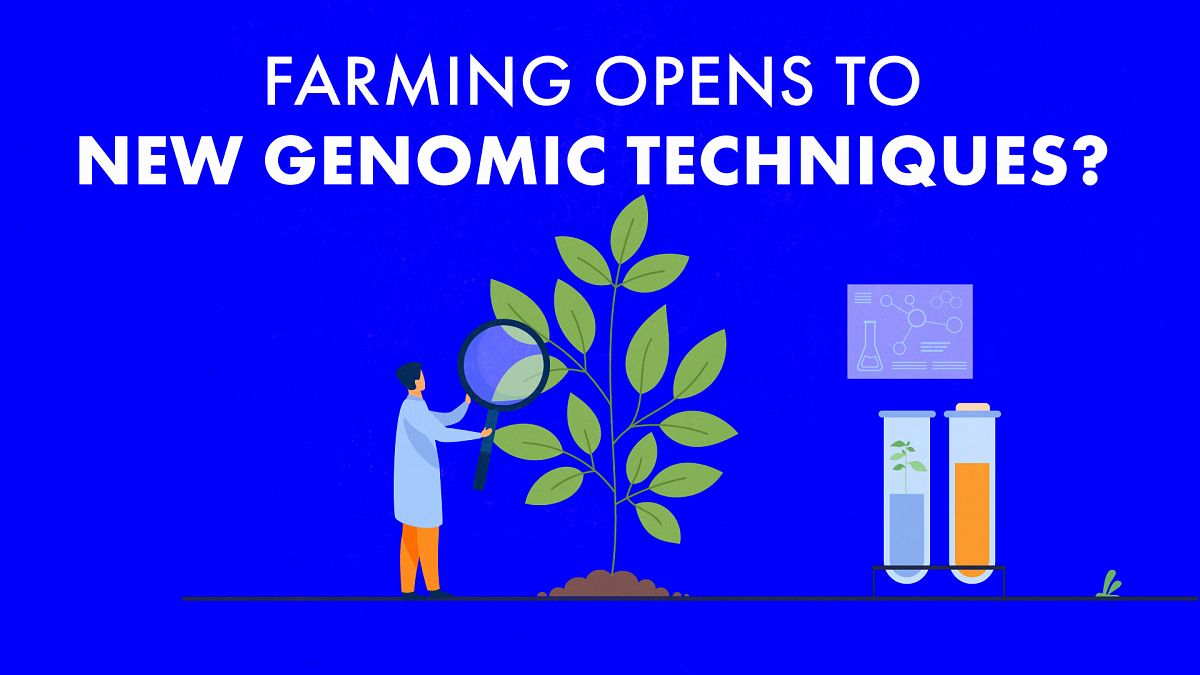The European Union has just taken a step towards deregulating New Genomic Techniques used for the improvement of agricultural plants. The agrichemical sector argues that they are essential to ensuring the future of food production, but many remain sceptical.
In the late 20th century, genes from different species were introduced into seeds, creating Genetically Modified Organisms, known as GMOs. The aim of the technology is to develop more resilient plant lines and increase productivity.
About two decades ago, the European Union implemented strict rules to cover authorisation, labelling and risk assessment; but now it has proposed deregulation of New Genomic Techniques, which modify the plants’ own genes.
“The European Commission has decided to create two categories: one for products from these new techniques and one for the old ones, which will continue to be subject to the existing rules. However, some people think that these new types of GMOs carry the same risks as the old ones, with unpredictable impacts on the environment,” explains Robert Hodgson, who covers the issue for Euronews.
The controversy is likely to flare up again because this month the governments of the 27 member states reached an agreement on the proposal, and ministers will now have to reach a consensus with the European Parliament, which has a different position on thorny issues such as patents and labelling.
On a short tour of several cities, Euronews collected some European opinions. “I’m not totally against it. It would be important to do thorough research to determine if it has any side effects,” said a Berlin resident.
“In recent decades there has been a huge development of this technology and we still do not have full control over it,” said another from Warsaw (Poland).
“They need to be labelled, it’s absolutely necessary so that the consumer can have a choice. Personally, I wouldn’t buy them,” was the opinion of a passer-by in Lyon (France).
Biotechnology experts argue that these plant varieties will be more resistant to drought, pests and require less fertilizer. Health issues such as allergies are also being targeted, through low-gluten grains for example.
Detractors point to the risks: disruption of pollinating insects, contamination of organic agricultural products, reduced access to seeds for small farmers and unforeseen effects on human health.
Will patents lead to small farmers exclusion?
The European Council was divided on whether to allow patents, weighing arguments that this could restrict the choices available to farmers and create monopolies. It took almost a year for them to decide to allow patents, as long as their specific reporting requirements were met.
The European Parliament’s position is to completely ban patents, explained one of the shadow rapporteurs for the legislative review.
“If a few big international agrichemical groups have a monopoly on seeds, farmers will pay more, they won’t be able to choose and, above all, we will no longer be able to openly innovate on varieties,” said Christophe Clergeau, a French centre-left MEP.
Few member states have actually shown much interest in GM crops, Spain being the exception. In many countries, these techniques have even been banned, with governments exercising their right to opt-out, but this option may no longer exist for all categories.
“It was about ten years ago when this issue really became a political hot potato and there was a lot of public opposition in Europe. Governments demanded an opt-out and they granted it,” explains Hodgson, adding: “As plants in the new category will be largely equivalent to common natural plants, governments will no longer have the option of banning their cultivation.”
Parliamentarian Clergeau stresses that “we are at the beginning of this new technology”, arguing that the EU must be very careful because “when we intervene in nature, we trigger cascades of changes that can pose dangers to biodiversity”.
A new world of possibilities is rapidly opening up for food production, with researchers already exploring how generative artificial intelligence can be applied to the technology. Not without controversy!
Watch the video here!
Journalist: Isabel Marques da Silva
Content production: Pilar Montero López
Video production: Zacharia Vigneron
Graphism: Loredana Dumitru
Editorial coordination: Ana Lázaro Bosch and Jeremy Fleming-Jones



